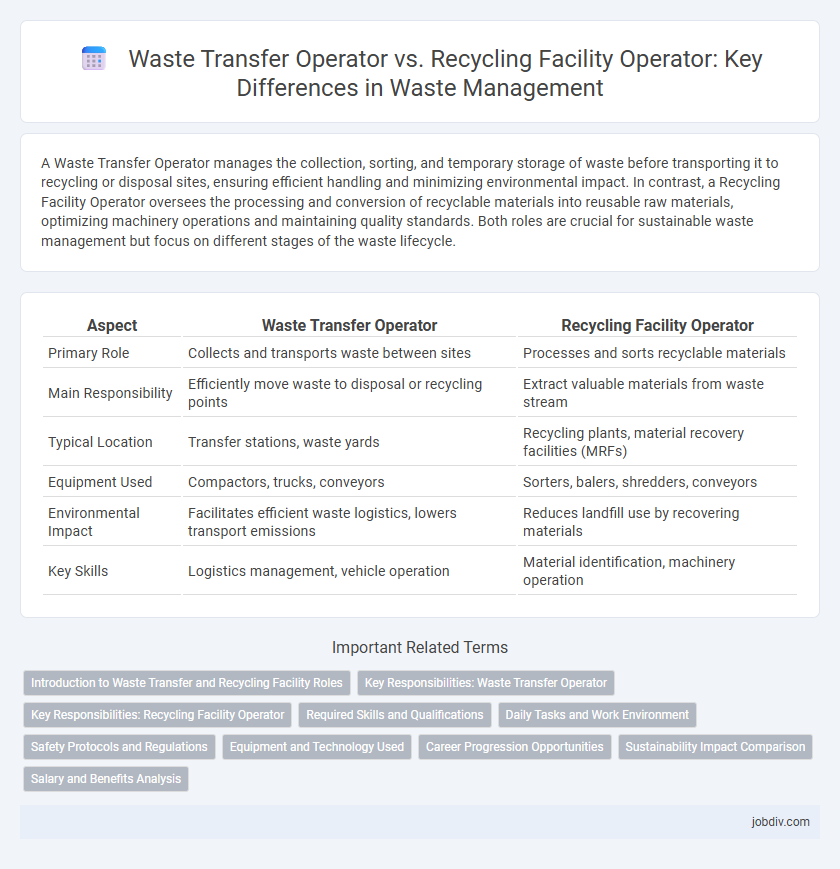A Waste Transfer Operator manages the collection, sorting, and temporary storage of waste before transporting it to recycling or disposal sites, ensuring efficient handling and minimizing environmental impact. In contrast, a Recycling Facility Operator oversees the processing and conversion of recyclable materials into reusable raw materials, optimizing machinery operations and maintaining quality standards. Both roles are crucial for sustainable waste management but focus on different stages of the waste lifecycle.
Table of Comparison
| Aspect | Waste Transfer Operator | Recycling Facility Operator |
|---|---|---|
| Primary Role | Collects and transports waste between sites | Processes and sorts recyclable materials |
| Main Responsibility | Efficiently move waste to disposal or recycling points | Extract valuable materials from waste stream |
| Typical Location | Transfer stations, waste yards | Recycling plants, material recovery facilities (MRFs) |
| Equipment Used | Compactors, trucks, conveyors | Sorters, balers, shredders, conveyors |
| Environmental Impact | Facilitates efficient waste logistics, lowers transport emissions | Reduces landfill use by recovering materials |
| Key Skills | Logistics management, vehicle operation | Material identification, machinery operation |
Introduction to Waste Transfer and Recycling Facility Roles
Waste Transfer Operators manage the collection, consolidation, and transportation of waste materials from various collection points to processing or disposal sites, ensuring efficient handling during the logistics phase. Recycling Facility Operators focus on sorting, processing, and transforming recyclable materials into reusable raw materials, playing a critical role in resource recovery and environmental sustainability. Both roles are integral to the waste management system, facilitating proper waste flow and promoting circular economy practices.
Key Responsibilities: Waste Transfer Operator
Waste Transfer Operators manage the efficient collection, sorting, and temporary storage of waste materials to facilitate transport to recycling or disposal sites. They ensure compliance with environmental regulations, maintain equipment, and monitor waste segregation to optimize recycling rates. Their role is critical in minimizing contamination and improving the overall waste management process.
Key Responsibilities: Recycling Facility Operator
Recycling Facility Operators manage the sorting, processing, and distribution of recyclable materials to ensure compliance with environmental regulations and maximize recovery rates. They operate machinery for shredding, baling, and compacting waste, monitor contamination levels, and maintain detailed records of throughput and material types. These operators also coordinate with waste transfer operators and downstream recycling partners to optimize waste diversion efforts and enhance sustainability outcomes.
Required Skills and Qualifications
Waste Transfer Operators require proficiency in handling heavy machinery, knowledge of safety protocols, and basic record-keeping skills to ensure efficient waste collection and sorting. Recycling Facility Operators must possess expertise in materials identification, advanced equipment operation, and quality control to optimize recycling processes and reduce contamination. Both roles demand strong attention to detail, physical stamina, and compliance with environmental regulations to maintain workplace safety and sustainability standards.
Daily Tasks and Work Environment
Waste Transfer Operators manage the collection, sorting, and consolidation of waste materials at transfer stations, ensuring efficient loading and unloading of trucks to facilitate transportation to recycling or disposal sites. Recycling Facility Operators focus on processing and separating recyclable materials, operating machinery such as shredders, conveyors, and balers to prepare materials for resale or further manufacturing. Waste Transfer Operators typically work outdoors and handle heavy lifting with exposure to varying weather conditions, while Recycling Facility Operators are often based indoors in controlled environments with detailed attention to machinery operation and material quality control.
Safety Protocols and Regulations
Waste Transfer Operators and Recycling Facility Operators must rigorously adhere to safety protocols and regulations to prevent hazards associated with waste handling. Compliance with OSHA standards, proper use of personal protective equipment (PPE), and adherence to environmental regulations such as the Resource Conservation and Recovery Act (RCRA) are critical for both roles to minimize exposure to hazardous materials and ensure safe operations. Continuous training in waste categorization, spill response, and equipment handling further enhances operational safety and regulatory compliance.
Equipment and Technology Used
Waste Transfer Operators primarily utilize heavy machinery such as compactors, front-end loaders, and transfer trailers to efficiently collect, consolidate, and transport waste materials. Recycling Facility Operators employ advanced sorting technologies including optical sorters, magnetic separators, and conveyor systems to accurately separate recyclables from mixed waste streams. The integration of automated equipment in recycling facilities enhances material recovery rates and reduces operational downtime compared to the more transport-focused equipment deployed by waste transfer operations.
Career Progression Opportunities
Waste Transfer Operators manage the collection and sorting of waste for transportation, with career progression often leading to supervisory roles or specialized positions in logistics and environmental compliance. Recycling Facility Operators focus on processing recyclable materials, offering advancement paths into equipment maintenance supervision, quality control management, or environmental health and safety coordination within the recycling industry. Both careers provide opportunities to move into sustainability consulting, waste management planning, or regulatory affairs, reflecting growing demand for expertise in circular economy principles and environmental compliance.
Sustainability Impact Comparison
Waste Transfer Operators primarily focus on consolidating and transporting waste, which streamlines collection but often results in increased transportation emissions, whereas Recycling Facility Operators directly process materials to recover resources, significantly reducing landfill dependency and conserving raw materials. The sustainability impact of Recycling Facility Operators is markedly higher due to their role in converting waste into reusable inputs, promoting circular economy principles. Efficient operation at recycling facilities lowers greenhouse gas emissions by decreasing the need for virgin material extraction and minimizes environmental contamination compared to mere waste transfer processes.
Salary and Benefits Analysis
Waste Transfer Operators typically earn an average salary ranging from $35,000 to $45,000 annually, with benefits often including health insurance, retirement plans, and paid time off. Recycling Facility Operators generally receive a slightly higher salary, averaging between $40,000 and $50,000 per year, accompanied by benefits such as health coverage, performance bonuses, and professional development opportunities. Salary differences reflect the varied responsibilities and technical skills required, with Recycling Facility Operators often benefiting from enhanced compensation packages due to the complexity of recycling processes.
Waste Transfer Operator vs Recycling Facility Operator Infographic

 jobdiv.com
jobdiv.com